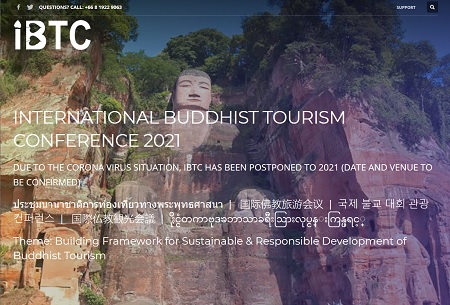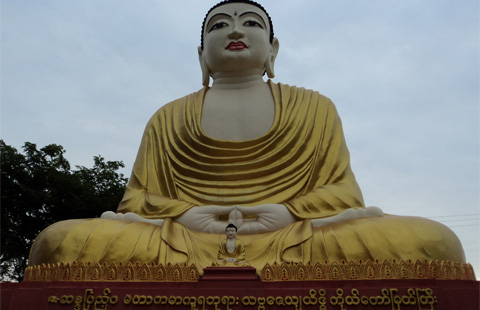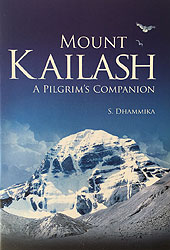Welcome to Buddhist Travel
 The only portal dedicated to the promotion of sustainable tourism for Buddhist sites and places of interests.
The only portal dedicated to the promotion of sustainable tourism for Buddhist sites and places of interests.
We welcome participation of tour agents and community centers.

International Buddhist Tourism Conference (IBTC) webinars

International Buddhist Tourism Conference (IBTC) webinars are organized during these Covid-19 times to introduce Buddhist related travels and pilgrimage activities, to provide a platform for organizations and like-minded people related to Buddhist Tourism to enable them to connect, share experiences and learn from one another. As the IBTC has been postponed indefinitely, these 4-part webinar series will now be presented as pre-conference events and this is part one of the series.
To view recordings of the sessions, click here: https://tourismwebinar.com/buddhist/

Journal Article: Towards Sustainable Development of Buddhist Tourism in South East Asia (Singapore Management Journal, Vol.9, No. 1)
 In 2011, the UNWTO prepared the “Religious Tourism in Asia and the Pacific” study to highlight the significance of religious tourism in Asia and the Pacific regions. The study found that places of religious importance are often the most visited destinations in many Asian countries. Even though Buddhism originated and is followed by a large population in Asia, in particularly South East Asia, Buddhist Tourism has not received the same attention as tourism related to Islam or Hinduism in the region. It is in this context that the contribution of Buddhist heritage to tourism in Asian and South East Asian countries is undertaken. This paper takes a snapshot of Buddhist Tourism in South East Asia and includes the following aspects: significant tangible and intangible Buddhist heritage developed in the country and its use for tourism purposes; visitation patterns to Buddhist sites; promotion of Buddhist tourism; and management of Buddhist destinations and heritage; use of technology in the marketing and management of Buddhist tourism and destinations; and challenges facing the growth and sustainable development of Buddhist tourism.
In 2011, the UNWTO prepared the “Religious Tourism in Asia and the Pacific” study to highlight the significance of religious tourism in Asia and the Pacific regions. The study found that places of religious importance are often the most visited destinations in many Asian countries. Even though Buddhism originated and is followed by a large population in Asia, in particularly South East Asia, Buddhist Tourism has not received the same attention as tourism related to Islam or Hinduism in the region. It is in this context that the contribution of Buddhist heritage to tourism in Asian and South East Asian countries is undertaken. This paper takes a snapshot of Buddhist Tourism in South East Asia and includes the following aspects: significant tangible and intangible Buddhist heritage developed in the country and its use for tourism purposes; visitation patterns to Buddhist sites; promotion of Buddhist tourism; and management of Buddhist destinations and heritage; use of technology in the marketing and management of Buddhist tourism and destinations; and challenges facing the growth and sustainable development of Buddhist tourism.
To read the article, cleck here: Singapore Management Journal, Vol.9, No. 1

Book: Buddhist Tourism in Asia: Towards Sustainable Development (Published by UNWTO)
 Buddhism emerged in the Indian subcontinent around the 6th century. Before long, Buddhist philosophy had spread across Asia, permeating all aspects of life. Buddhism was the backbone of many Asian civilizations, resulting in the creation of a rich and vast cultural heritage, both tangible and intangible. This has left an indelible mark on the region.
Buddhism emerged in the Indian subcontinent around the 6th century. Before long, Buddhist philosophy had spread across Asia, permeating all aspects of life. Buddhism was the backbone of many Asian civilizations, resulting in the creation of a rich and vast cultural heritage, both tangible and intangible. This has left an indelible mark on the region.
This report is built on case studies of Buddhist tourism in 16 countries across Asia. These destination countries are not only home to large numbers of Buddhists, they also showcase the legacy of Buddhism, with many examples of its tangible and intangible heritage. Visitation patterns to Buddhist sites, the management of Buddhist destinations and heritage, marketing and promotion – with a special emphasis on the place of technology – are some of the key issues discussed below.
The Buddhist Channel (parent owner of Buddhistravel.com), in collaboration with Prof. Dr. Victor Wee of Taylor's University, Malaysia took about 8 months of research, writing and editing to cover the Main Introduction to Buddhism as well as all the Southeast Asian countries covered in this study. This work is a "must have" for tour developers and managers.
To purchase the book, please visit: Buddhist Tourism in Asia: Towards Sustainable Development

International Buddhist Tourism Conference (IBTC)
 The International Buddhist Tourism Conference (IBTC) is the first gathering of its kind organized to meet the growing demands of Buddhist related travels and pilgrimage activities. IBTC is organized to provide a platform for organizations and like-minded people related to Buddhist Tourism to enable them to connect, share experiences and learn from one another.
The International Buddhist Tourism Conference (IBTC) is the first gathering of its kind organized to meet the growing demands of Buddhist related travels and pilgrimage activities. IBTC is organized to provide a platform for organizations and like-minded people related to Buddhist Tourism to enable them to connect, share experiences and learn from one another.
IBTC aims to address these issues in detail via discussions and idea sharing by key stakeholders.
IBTC will introduce the theme “Building Framework for Sustainable & Responsible Development of Buddhist Tourism” to open participants’ and hosts’ minds on how responsibly organized Buddhist tours and pilgrimages can be a benefit to visitors and to local communities, local culture, the environment while at the same time sustaining authentic local Buddhist rites and rituals without corrupting their intrinsic values.
For more information, please visit: The International Buddhist Tourism Conference (IBTC)





















